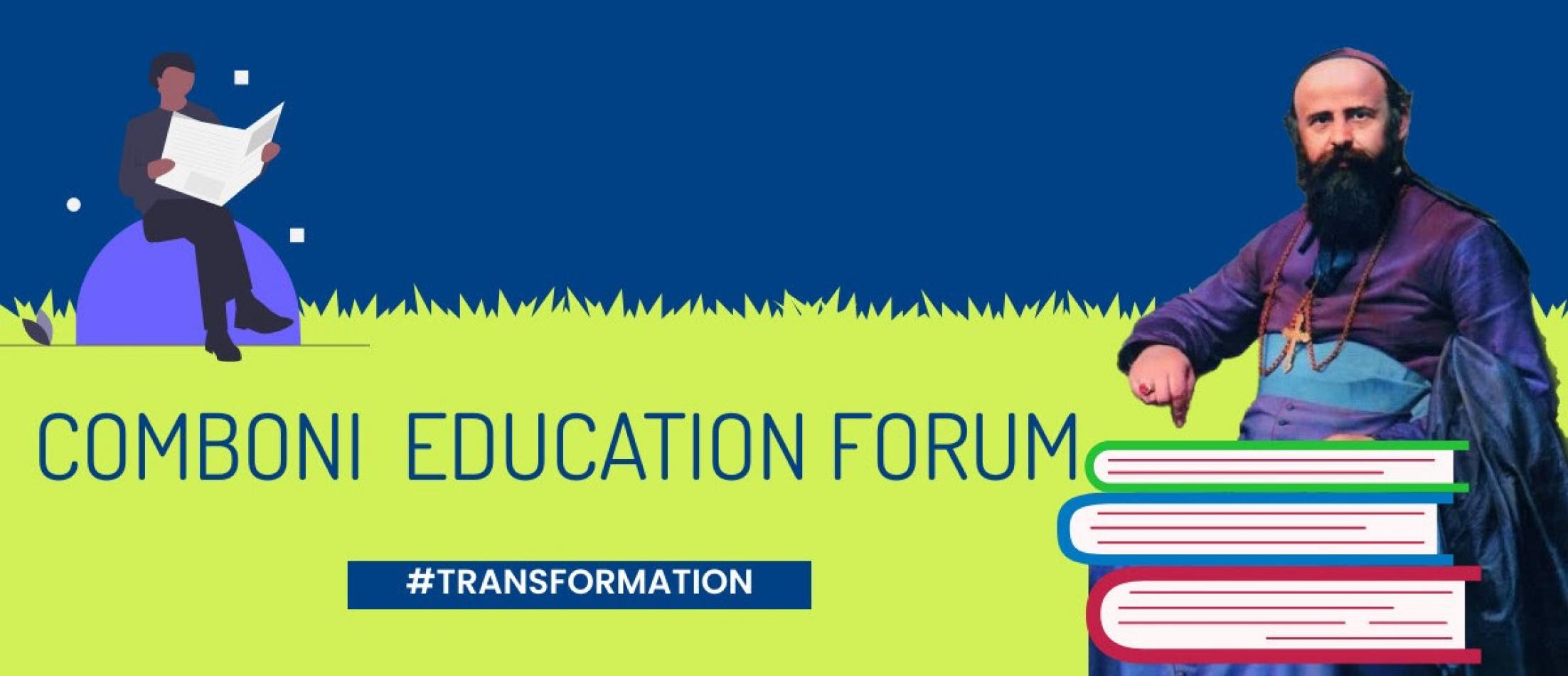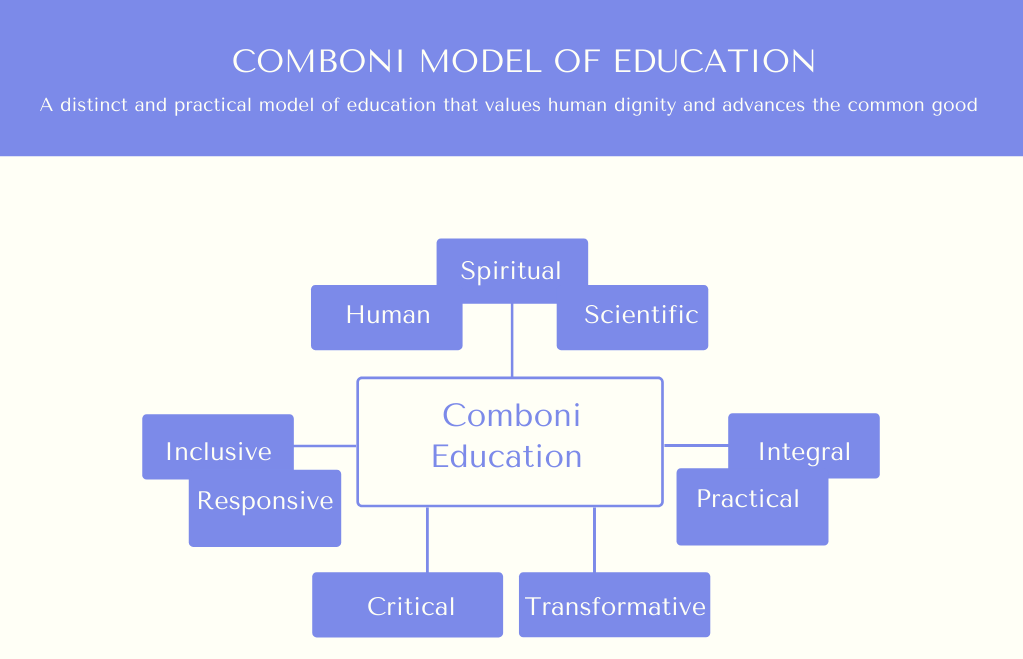Daniele Comboni
Missionari Comboniani
Area istituzionale
Altri link
Newsletter
Monday, May 24, 2021
On 16th April 2021, a number of Comboni educators from Kenya, Egypt, Malawi, Uganda met virtually to reflect on their presence in different educational institutions; primary to tertiary level of education. This informal group shared some reflections directed towards a Comboni model of education. This was important because education has been part and parcel of the Comboni charism and the priority for the many circoncriptions.
From the time of Daniel Comboni to the present time, education has been used as an important tool for evangelization and engagement of a Comboni missionary on the continent. It is a heritage that this informal group of educators urge Combonis to continue to value in their missionary endeavours.
Many confreres working in English speaking Africa are engaged in education from primary to tertiary level. The assumption is that their education approach is influenced by the Comboni charism and the vision of Comboni for the regeneration of Africa. However, the reality is that there is no conversation taking place amongst these educators and the absence of conversation means that there is a loss on the possibility of learning from each other. Learning that is critical in an era where the education sector is changing and as observed currently, changes accelerated by the Covid-19 pandemic. These changes have implications for the future orientation of the education sector and thus, the Comboni ministry.
In view of these projected changes, recently, the Pope launched the global compact on education which is an initiative to rethink the role of education in this time of crisis and the future. Pope Francis wants a “process of education” that leads future generations to pay attention to “grave social injustices, violations of rights, terrible forms of poverty, and the waste of human lives.” He wants the “integral process” to take into consideration the problems that beset young people today, such as “depression, addiction, aggressiveness, verbal hatred, and bullying.” The question is how ready are the Comboni Missionaries to adapt and align themselves to the changing trends in education?
It was on this backdrop that this informal group of Comboni educators assembled on the virtual forum organized for the participants to reflect on their educational models, share experiences, learn from each other and define the characteristics of a model inspired by the Comboni charism. In this particular forum there were 11 confreres representing Comboni institutions in Malawi, Sudan, Egypt, Kenya and Uganda. The following are the themes and issues that emerged from their reflection.
Emerging themes from the reflection
The aspect of an education that embraces inclusion and diversity emerges from the presentation of various institutions’ model of education. The institutions also focus on spiritual, scientific, civic, technical and human formation. There is an integral and practical approach to education as educators encounter and journey with students, aiming at their discipline, growth, transformation, self reliance and contribution to society that has a positive impact on social development. The educators are driven by “passion, dedication, sense of mission and service,” as they evoke in their students “a different imagination, a critical consciousness, a critical approach to reality,” that responds to issues and promotes values that others do not address. It is an education that responds to current needs of society in line with the mission of the Church. An education that considers and offers hope to the marginalized, poor, those at the periphery in order to give them a chance to rebuild their lives. An education that promotes ecumenism and forms pastoral and social agents concerned with the value of human rights. An education that seeks to realize its visionary Comboni’s plan for the regeneration of Africa by enabling Africans champion the transformation of Africa.
The emerging challenges from the conversation
There is a need to reflect further on the Comboni approach to education and identify emerging patterns. There is also the need to work towards a shared vision of the Comboni education ministry amidst the differences in context and institutions. Additionally, in view of the error caused by ignoring Vocational and Technical education there is a proposition to have a broader vision on education, the suggestion is for the next ten years. There’s also the reflection on Combonis space in education in the Arab world in view of the inadequate national syllabus and pedagogy and the unaffordable international curricula. The proposition forwarded is to develop a humanistic and technologically driven curriculum for primary and secondary schools.
Moreover, in the drive to encourage members to make an effort towards a coordinated effort of their involvement in education, the Salesians have a network of schools pushing for accreditation at AU in Addis Abeba focusing on policy change in technical education. They also have an office in Nairobi coordinating their technical education in Africa. Their objective is to influence technical education policies and practices in Africa.
Besides the coordinated effort, there is also the need to evaluate the impact of the Combonis educational work, as assisted by experts. The emphasis is to invest more in research on Comboni education. Further, in various cases, there is also the lack in ownership of the Institutions where the Combonis work, which blocks them when they want to innovate, develop the Institution, etc. Forwaded is also the proposition of developing and sharing a management approach despite the curriculum depending on country governments. There is also the question of making education affordable without dependence from donors and keeping up with technological development as well as considering the constraints to curriculum: what are the avenues to introduce additional elements? As suggested, there is room for extra-curricular, other educational avenues, etc, and the need to consider advocacy to influence curriculum development.
Way forward
In outlining a way forward, the group nominated Bro. Jonas, Fr Jorge, and Bro. Alberto as members of the steering committee to animate the informal group on education. The steering committee members are to organize the meetings and the agenda to be discussed every two months. Members were encouraged to look at different domains, such as informal, formal (basic, VT education, University), formation of leaders, etc. Further, a database of all confreres involved in education is to be built and a form developed for use in gathering information on their different experiences. The group also considered the possibility of having a Newsletter that will serve a vehicle to share videly the richness of Comboni ministry in education.
[combonimission.net]






